Travel and Tourism Business Toolkit: Business Decision-Making Report
VerifiedAdded on 2020/12/09
|13
|3787
|92
Report
AI Summary
This report provides a comprehensive analysis of the travel and tourism business toolkit, focusing on key aspects such as revenue management, HR life cycles, performance management, and relevant legislation. The report examines the rationale and principles of revenue management, including its application within the travel and tourism sector, with specific tools like pricing, inventory, technology, marketing, and distribution channels. It delves into the HR life cycle, emphasizing recruitment, education, motivation, and employee retention strategies. Additionally, it discusses performance management plans and techniques to address negative behaviors. Furthermore, the report explores the legal and ethical considerations within the tourism industry, including company, employment, and contract law and their impact on business decision-making. The report uses TUI as a case study to illustrate these concepts, concluding with a discussion on budget management and financial reporting.
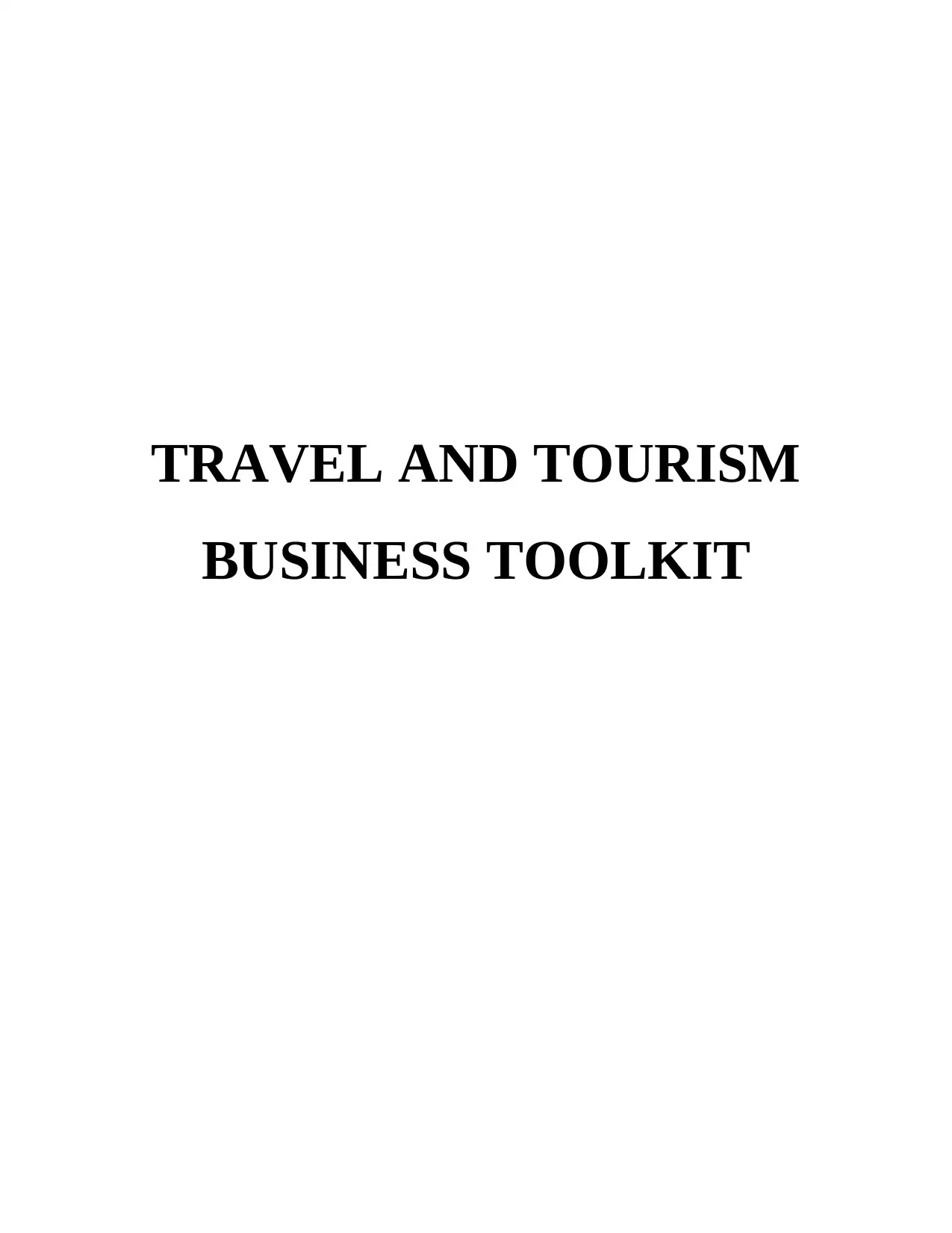
TRAVEL AND TOURISM
BUSINESS TOOLKIT
BUSINESS TOOLKIT
Paraphrase This Document
Need a fresh take? Get an instant paraphrase of this document with our AI Paraphraser
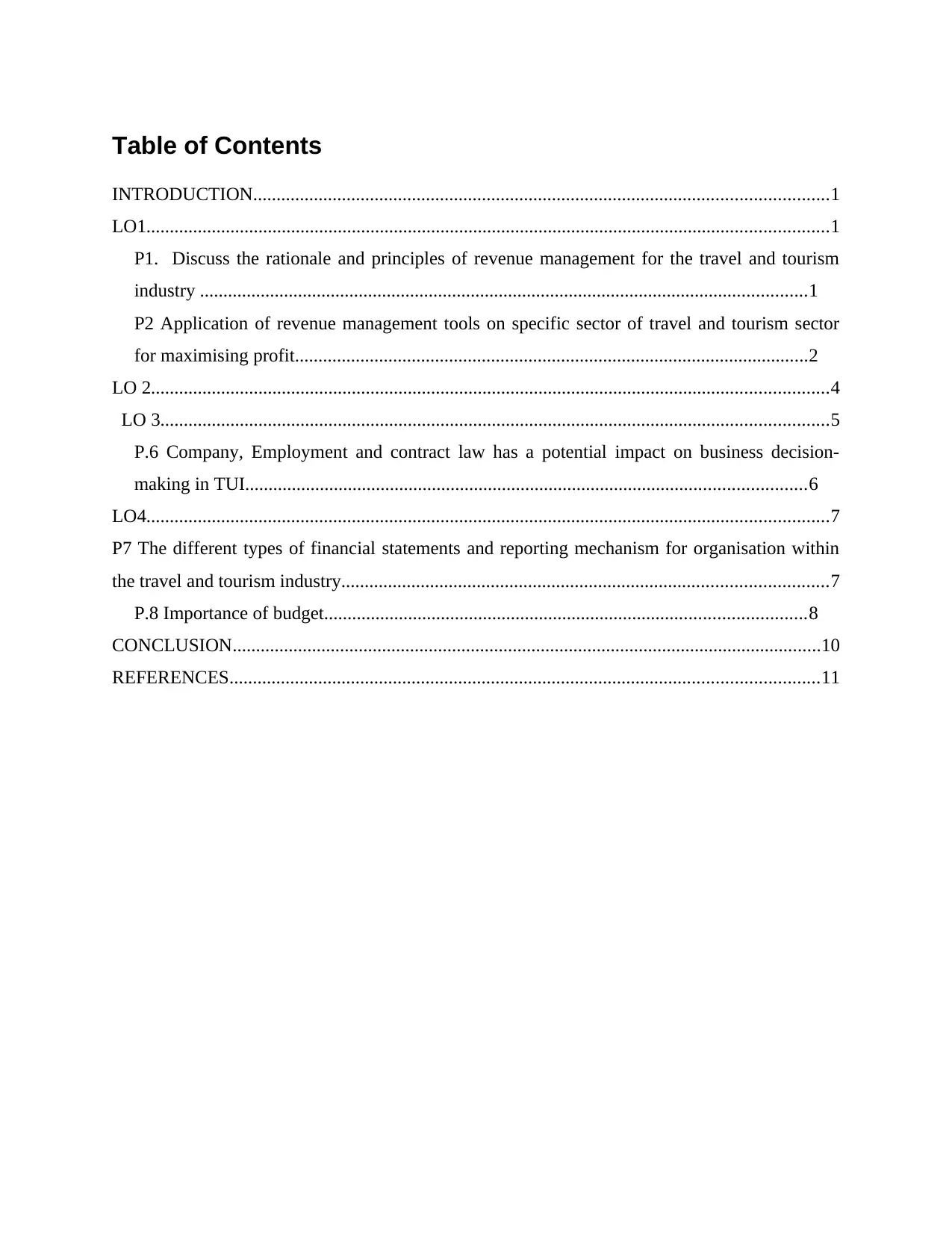
Table of Contents
INTRODUCTION...........................................................................................................................1
LO1..................................................................................................................................................1
P1. Discuss the rationale and principles of revenue management for the travel and tourism
industry ..................................................................................................................................1
P2 Application of revenue management tools on specific sector of travel and tourism sector
for maximising profit..............................................................................................................2
LO 2.................................................................................................................................................4
LO 3...............................................................................................................................................5
P.6 Company, Employment and contract law has a potential impact on business decision-
making in TUI........................................................................................................................6
LO4..................................................................................................................................................7
P7 The different types of financial statements and reporting mechanism for organisation within
the travel and tourism industry........................................................................................................7
P.8 Importance of budget.......................................................................................................8
CONCLUSION..............................................................................................................................10
REFERENCES..............................................................................................................................11
INTRODUCTION...........................................................................................................................1
LO1..................................................................................................................................................1
P1. Discuss the rationale and principles of revenue management for the travel and tourism
industry ..................................................................................................................................1
P2 Application of revenue management tools on specific sector of travel and tourism sector
for maximising profit..............................................................................................................2
LO 2.................................................................................................................................................4
LO 3...............................................................................................................................................5
P.6 Company, Employment and contract law has a potential impact on business decision-
making in TUI........................................................................................................................6
LO4..................................................................................................................................................7
P7 The different types of financial statements and reporting mechanism for organisation within
the travel and tourism industry........................................................................................................7
P.8 Importance of budget.......................................................................................................8
CONCLUSION..............................................................................................................................10
REFERENCES..............................................................................................................................11
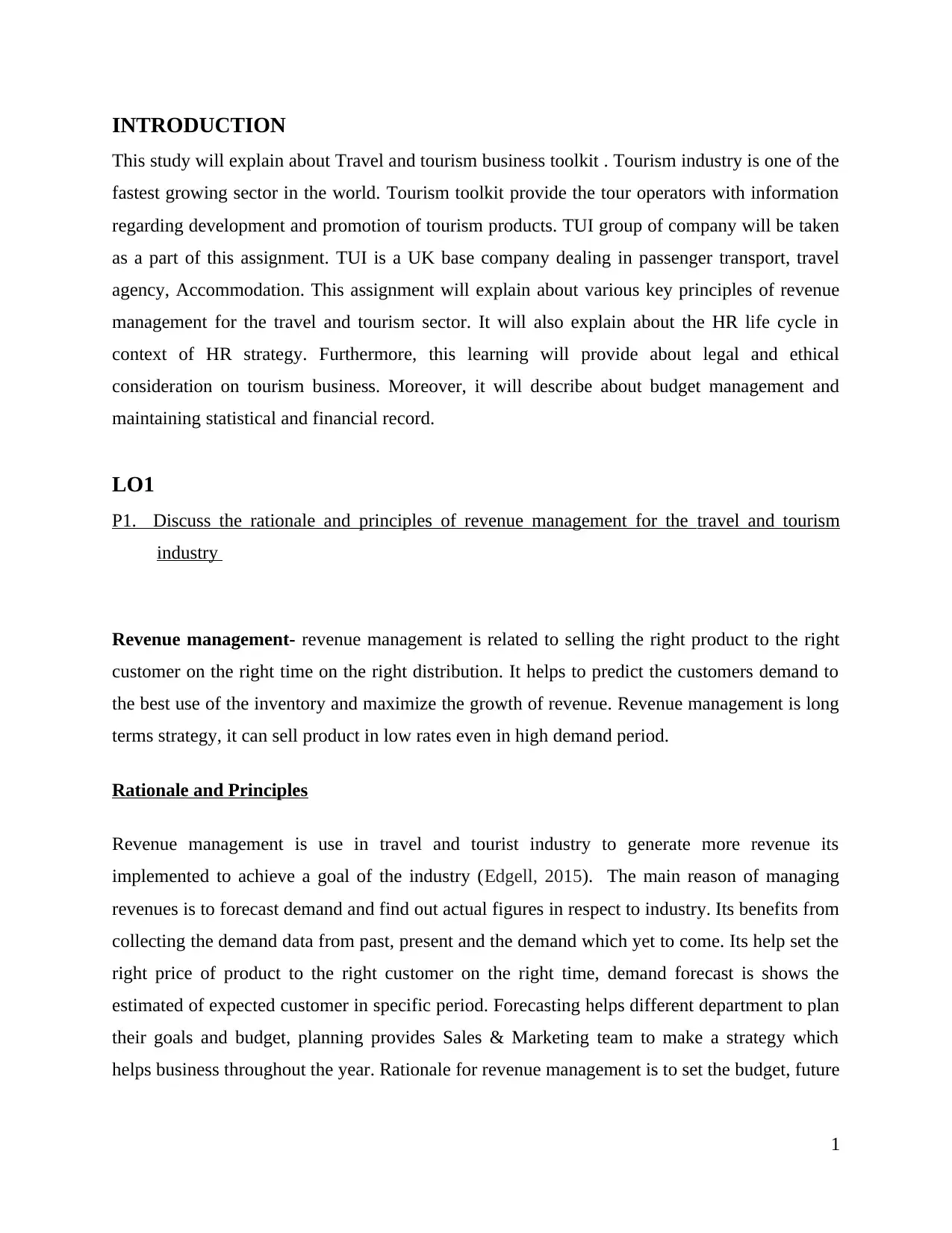
INTRODUCTION
This study will explain about Travel and tourism business toolkit . Tourism industry is one of the
fastest growing sector in the world. Tourism toolkit provide the tour operators with information
regarding development and promotion of tourism products. TUI group of company will be taken
as a part of this assignment. TUI is a UK base company dealing in passenger transport, travel
agency, Accommodation. This assignment will explain about various key principles of revenue
management for the travel and tourism sector. It will also explain about the HR life cycle in
context of HR strategy. Furthermore, this learning will provide about legal and ethical
consideration on tourism business. Moreover, it will describe about budget management and
maintaining statistical and financial record.
LO1
P1. Discuss the rationale and principles of revenue management for the travel and tourism
industry
Revenue management- revenue management is related to selling the right product to the right
customer on the right time on the right distribution. It helps to predict the customers demand to
the best use of the inventory and maximize the growth of revenue. Revenue management is long
terms strategy, it can sell product in low rates even in high demand period.
Rationale and Principles
Revenue management is use in travel and tourist industry to generate more revenue its
implemented to achieve a goal of the industry (Edgell, 2015). The main reason of managing
revenues is to forecast demand and find out actual figures in respect to industry. Its benefits from
collecting the demand data from past, present and the demand which yet to come. Its help set the
right price of product to the right customer on the right time, demand forecast is shows the
estimated of expected customer in specific period. Forecasting helps different department to plan
their goals and budget, planning provides Sales & Marketing team to make a strategy which
helps business throughout the year. Rationale for revenue management is to set the budget, future
1
This study will explain about Travel and tourism business toolkit . Tourism industry is one of the
fastest growing sector in the world. Tourism toolkit provide the tour operators with information
regarding development and promotion of tourism products. TUI group of company will be taken
as a part of this assignment. TUI is a UK base company dealing in passenger transport, travel
agency, Accommodation. This assignment will explain about various key principles of revenue
management for the travel and tourism sector. It will also explain about the HR life cycle in
context of HR strategy. Furthermore, this learning will provide about legal and ethical
consideration on tourism business. Moreover, it will describe about budget management and
maintaining statistical and financial record.
LO1
P1. Discuss the rationale and principles of revenue management for the travel and tourism
industry
Revenue management- revenue management is related to selling the right product to the right
customer on the right time on the right distribution. It helps to predict the customers demand to
the best use of the inventory and maximize the growth of revenue. Revenue management is long
terms strategy, it can sell product in low rates even in high demand period.
Rationale and Principles
Revenue management is use in travel and tourist industry to generate more revenue its
implemented to achieve a goal of the industry (Edgell, 2015). The main reason of managing
revenues is to forecast demand and find out actual figures in respect to industry. Its benefits from
collecting the demand data from past, present and the demand which yet to come. Its help set the
right price of product to the right customer on the right time, demand forecast is shows the
estimated of expected customer in specific period. Forecasting helps different department to plan
their goals and budget, planning provides Sales & Marketing team to make a strategy which
helps business throughout the year. Rationale for revenue management is to set the budget, future
1
⊘ This is a preview!⊘
Do you want full access?
Subscribe today to unlock all pages.

Trusted by 1+ million students worldwide
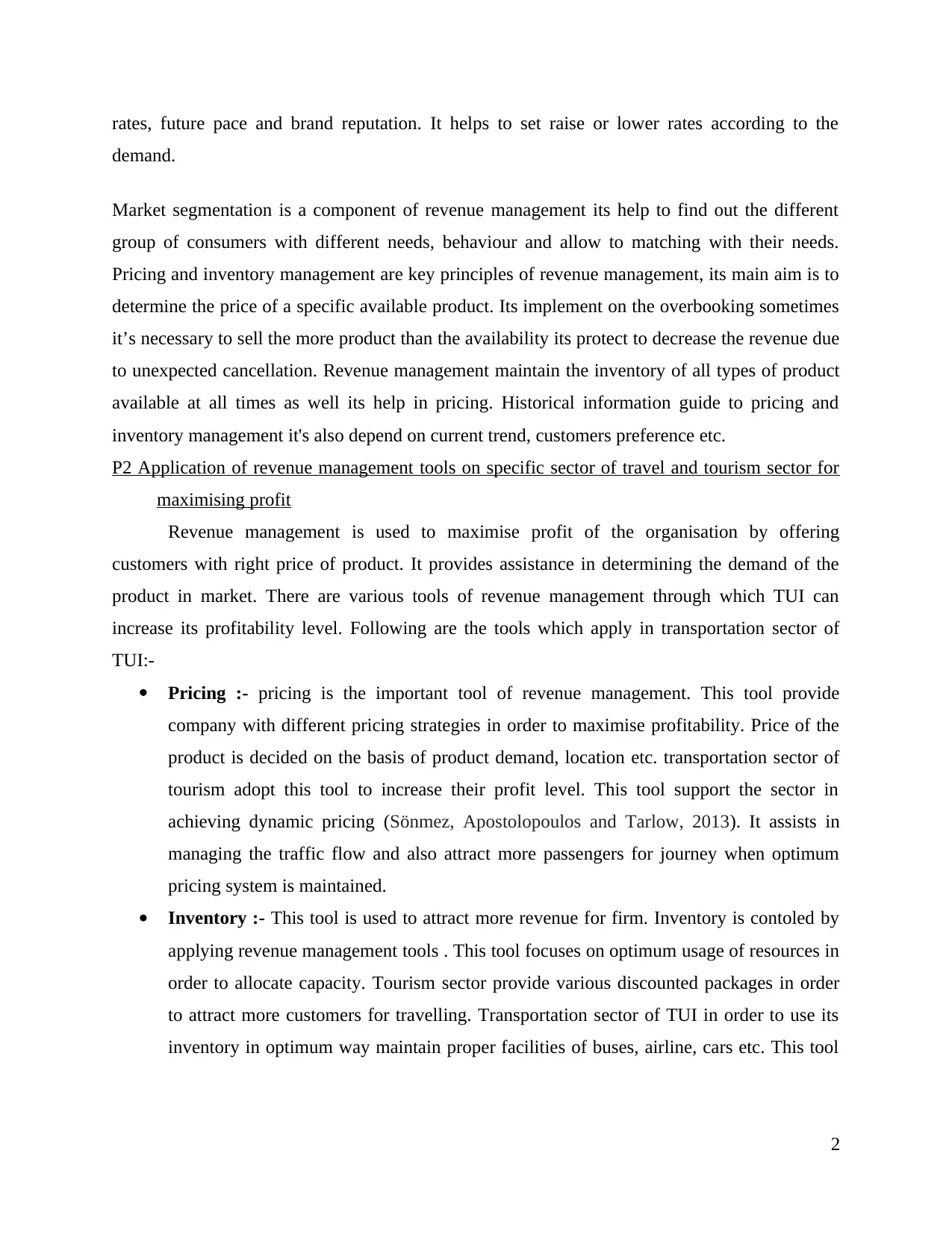
rates, future pace and brand reputation. It helps to set raise or lower rates according to the
demand.
Market segmentation is a component of revenue management its help to find out the different
group of consumers with different needs, behaviour and allow to matching with their needs.
Pricing and inventory management are key principles of revenue management, its main aim is to
determine the price of a specific available product. Its implement on the overbooking sometimes
it’s necessary to sell the more product than the availability its protect to decrease the revenue due
to unexpected cancellation. Revenue management maintain the inventory of all types of product
available at all times as well its help in pricing. Historical information guide to pricing and
inventory management it's also depend on current trend, customers preference etc.
P2 Application of revenue management tools on specific sector of travel and tourism sector for
maximising profit
Revenue management is used to maximise profit of the organisation by offering
customers with right price of product. It provides assistance in determining the demand of the
product in market. There are various tools of revenue management through which TUI can
increase its profitability level. Following are the tools which apply in transportation sector of
TUI:-
Pricing :- pricing is the important tool of revenue management. This tool provide
company with different pricing strategies in order to maximise profitability. Price of the
product is decided on the basis of product demand, location etc. transportation sector of
tourism adopt this tool to increase their profit level. This tool support the sector in
achieving dynamic pricing (Sönmez, Apostolopoulos and Tarlow, 2013). It assists in
managing the traffic flow and also attract more passengers for journey when optimum
pricing system is maintained.
Inventory :- This tool is used to attract more revenue for firm. Inventory is contoled by
applying revenue management tools . This tool focuses on optimum usage of resources in
order to allocate capacity. Tourism sector provide various discounted packages in order
to attract more customers for travelling. Transportation sector of TUI in order to use its
inventory in optimum way maintain proper facilities of buses, airline, cars etc. This tool
2
demand.
Market segmentation is a component of revenue management its help to find out the different
group of consumers with different needs, behaviour and allow to matching with their needs.
Pricing and inventory management are key principles of revenue management, its main aim is to
determine the price of a specific available product. Its implement on the overbooking sometimes
it’s necessary to sell the more product than the availability its protect to decrease the revenue due
to unexpected cancellation. Revenue management maintain the inventory of all types of product
available at all times as well its help in pricing. Historical information guide to pricing and
inventory management it's also depend on current trend, customers preference etc.
P2 Application of revenue management tools on specific sector of travel and tourism sector for
maximising profit
Revenue management is used to maximise profit of the organisation by offering
customers with right price of product. It provides assistance in determining the demand of the
product in market. There are various tools of revenue management through which TUI can
increase its profitability level. Following are the tools which apply in transportation sector of
TUI:-
Pricing :- pricing is the important tool of revenue management. This tool provide
company with different pricing strategies in order to maximise profitability. Price of the
product is decided on the basis of product demand, location etc. transportation sector of
tourism adopt this tool to increase their profit level. This tool support the sector in
achieving dynamic pricing (Sönmez, Apostolopoulos and Tarlow, 2013). It assists in
managing the traffic flow and also attract more passengers for journey when optimum
pricing system is maintained.
Inventory :- This tool is used to attract more revenue for firm. Inventory is contoled by
applying revenue management tools . This tool focuses on optimum usage of resources in
order to allocate capacity. Tourism sector provide various discounted packages in order
to attract more customers for travelling. Transportation sector of TUI in order to use its
inventory in optimum way maintain proper facilities of buses, airline, cars etc. This tool
2
Paraphrase This Document
Need a fresh take? Get an instant paraphrase of this document with our AI Paraphraser
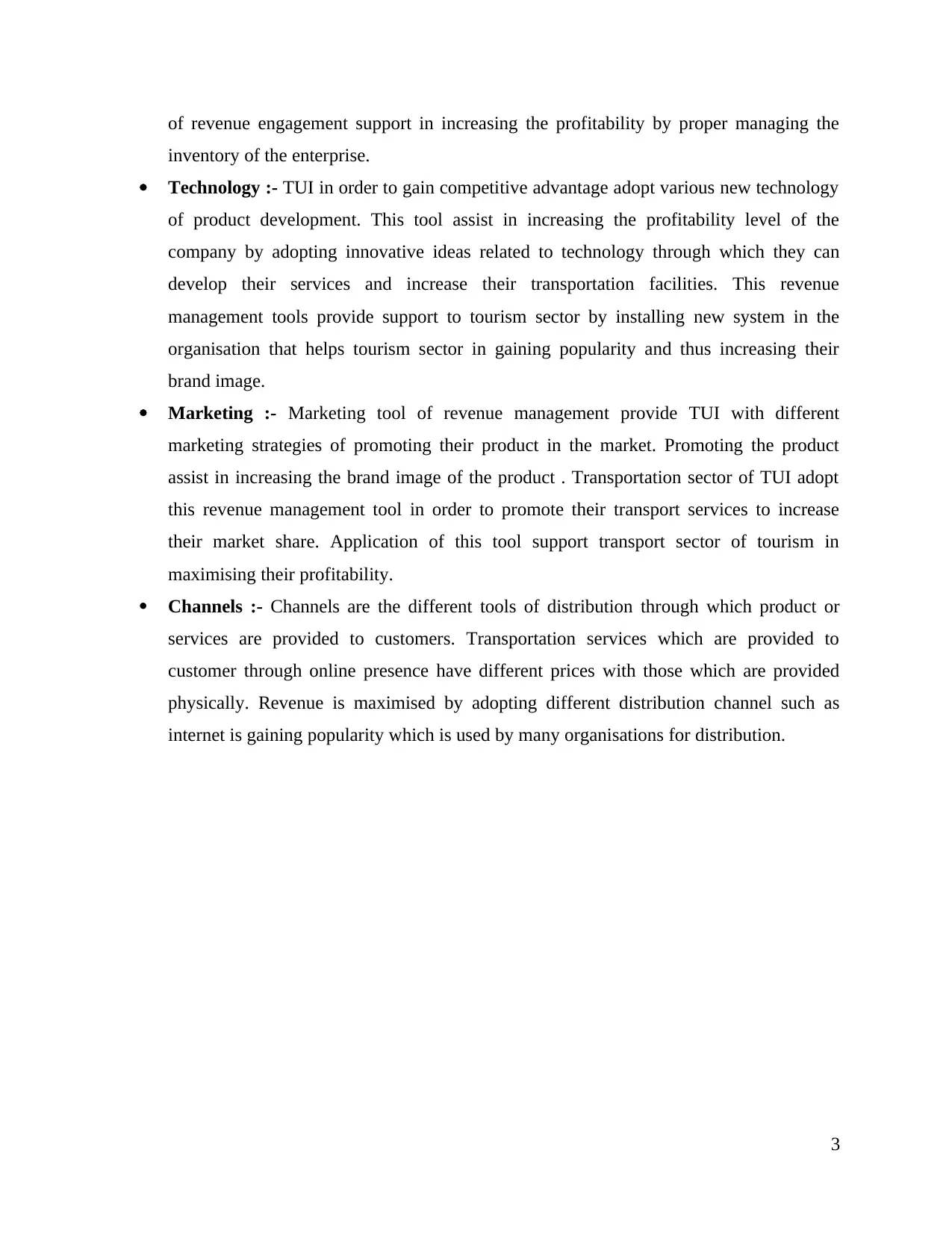
of revenue engagement support in increasing the profitability by proper managing the
inventory of the enterprise.
Technology :- TUI in order to gain competitive advantage adopt various new technology
of product development. This tool assist in increasing the profitability level of the
company by adopting innovative ideas related to technology through which they can
develop their services and increase their transportation facilities. This revenue
management tools provide support to tourism sector by installing new system in the
organisation that helps tourism sector in gaining popularity and thus increasing their
brand image.
Marketing :- Marketing tool of revenue management provide TUI with different
marketing strategies of promoting their product in the market. Promoting the product
assist in increasing the brand image of the product . Transportation sector of TUI adopt
this revenue management tool in order to promote their transport services to increase
their market share. Application of this tool support transport sector of tourism in
maximising their profitability.
Channels :- Channels are the different tools of distribution through which product or
services are provided to customers. Transportation services which are provided to
customer through online presence have different prices with those which are provided
physically. Revenue is maximised by adopting different distribution channel such as
internet is gaining popularity which is used by many organisations for distribution.
3
inventory of the enterprise.
Technology :- TUI in order to gain competitive advantage adopt various new technology
of product development. This tool assist in increasing the profitability level of the
company by adopting innovative ideas related to technology through which they can
develop their services and increase their transportation facilities. This revenue
management tools provide support to tourism sector by installing new system in the
organisation that helps tourism sector in gaining popularity and thus increasing their
brand image.
Marketing :- Marketing tool of revenue management provide TUI with different
marketing strategies of promoting their product in the market. Promoting the product
assist in increasing the brand image of the product . Transportation sector of TUI adopt
this revenue management tool in order to promote their transport services to increase
their market share. Application of this tool support transport sector of tourism in
maximising their profitability.
Channels :- Channels are the different tools of distribution through which product or
services are provided to customers. Transportation services which are provided to
customer through online presence have different prices with those which are provided
physically. Revenue is maximised by adopting different distribution channel such as
internet is gaining popularity which is used by many organisations for distribution.
3
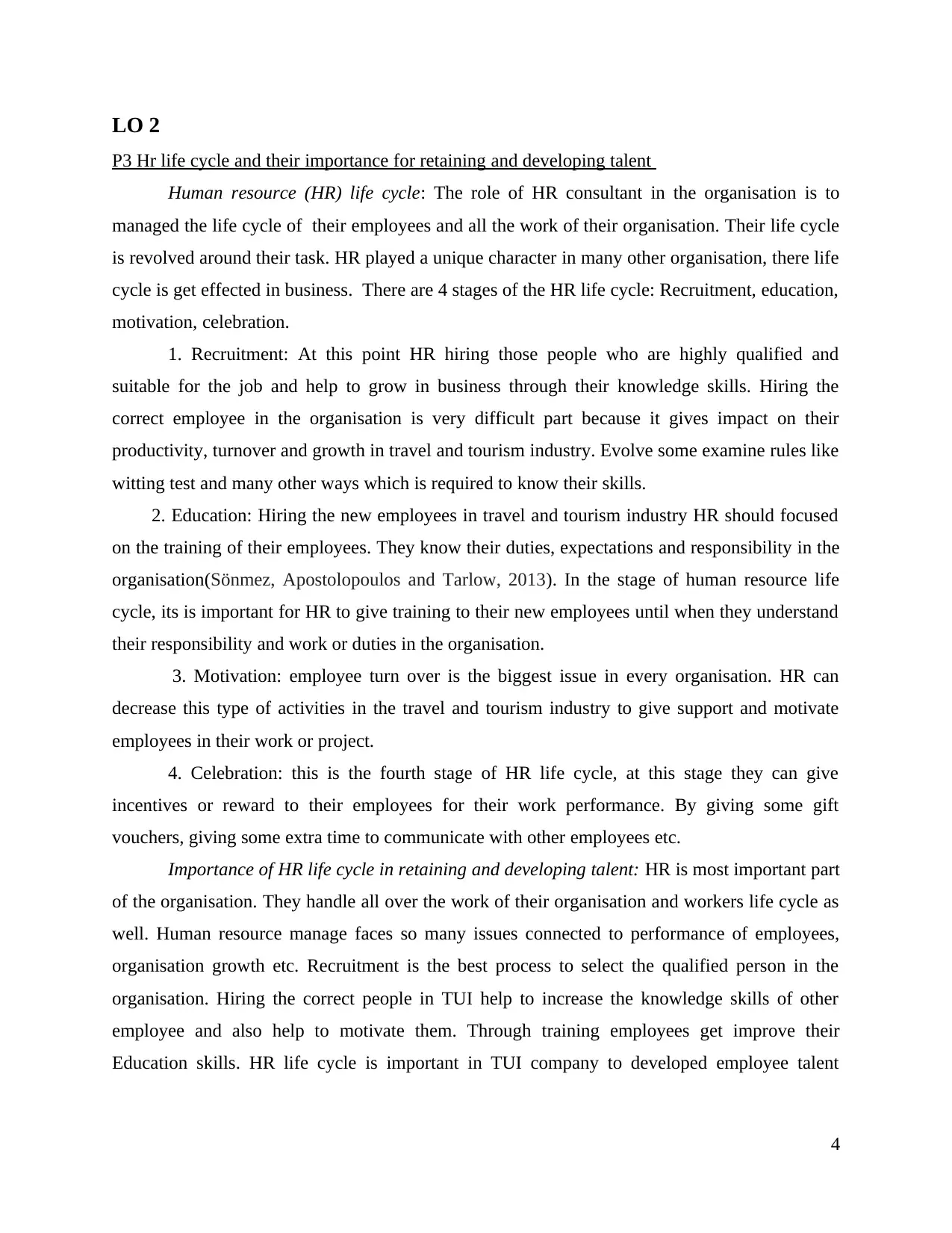
LO 2
P3 Hr life cycle and their importance for retaining and developing talent
Human resource (HR) life cycle: The role of HR consultant in the organisation is to
managed the life cycle of their employees and all the work of their organisation. Their life cycle
is revolved around their task. HR played a unique character in many other organisation, there life
cycle is get effected in business. There are 4 stages of the HR life cycle: Recruitment, education,
motivation, celebration.
1. Recruitment: At this point HR hiring those people who are highly qualified and
suitable for the job and help to grow in business through their knowledge skills. Hiring the
correct employee in the organisation is very difficult part because it gives impact on their
productivity, turnover and growth in travel and tourism industry. Evolve some examine rules like
witting test and many other ways which is required to know their skills.
2. Education: Hiring the new employees in travel and tourism industry HR should focused
on the training of their employees. They know their duties, expectations and responsibility in the
organisation(Sönmez, Apostolopoulos and Tarlow, 2013). In the stage of human resource life
cycle, its is important for HR to give training to their new employees until when they understand
their responsibility and work or duties in the organisation.
3. Motivation: employee turn over is the biggest issue in every organisation. HR can
decrease this type of activities in the travel and tourism industry to give support and motivate
employees in their work or project.
4. Celebration: this is the fourth stage of HR life cycle, at this stage they can give
incentives or reward to their employees for their work performance. By giving some gift
vouchers, giving some extra time to communicate with other employees etc.
Importance of HR life cycle in retaining and developing talent: HR is most important part
of the organisation. They handle all over the work of their organisation and workers life cycle as
well. Human resource manage faces so many issues connected to performance of employees,
organisation growth etc. Recruitment is the best process to select the qualified person in the
organisation. Hiring the correct people in TUI help to increase the knowledge skills of other
employee and also help to motivate them. Through training employees get improve their
Education skills. HR life cycle is important in TUI company to developed employee talent
4
P3 Hr life cycle and their importance for retaining and developing talent
Human resource (HR) life cycle: The role of HR consultant in the organisation is to
managed the life cycle of their employees and all the work of their organisation. Their life cycle
is revolved around their task. HR played a unique character in many other organisation, there life
cycle is get effected in business. There are 4 stages of the HR life cycle: Recruitment, education,
motivation, celebration.
1. Recruitment: At this point HR hiring those people who are highly qualified and
suitable for the job and help to grow in business through their knowledge skills. Hiring the
correct employee in the organisation is very difficult part because it gives impact on their
productivity, turnover and growth in travel and tourism industry. Evolve some examine rules like
witting test and many other ways which is required to know their skills.
2. Education: Hiring the new employees in travel and tourism industry HR should focused
on the training of their employees. They know their duties, expectations and responsibility in the
organisation(Sönmez, Apostolopoulos and Tarlow, 2013). In the stage of human resource life
cycle, its is important for HR to give training to their new employees until when they understand
their responsibility and work or duties in the organisation.
3. Motivation: employee turn over is the biggest issue in every organisation. HR can
decrease this type of activities in the travel and tourism industry to give support and motivate
employees in their work or project.
4. Celebration: this is the fourth stage of HR life cycle, at this stage they can give
incentives or reward to their employees for their work performance. By giving some gift
vouchers, giving some extra time to communicate with other employees etc.
Importance of HR life cycle in retaining and developing talent: HR is most important part
of the organisation. They handle all over the work of their organisation and workers life cycle as
well. Human resource manage faces so many issues connected to performance of employees,
organisation growth etc. Recruitment is the best process to select the qualified person in the
organisation. Hiring the correct people in TUI help to increase the knowledge skills of other
employee and also help to motivate them. Through training employees get improve their
Education skills. HR life cycle is important in TUI company to developed employee talent
4
⊘ This is a preview!⊘
Do you want full access?
Subscribe today to unlock all pages.

Trusted by 1+ million students worldwide
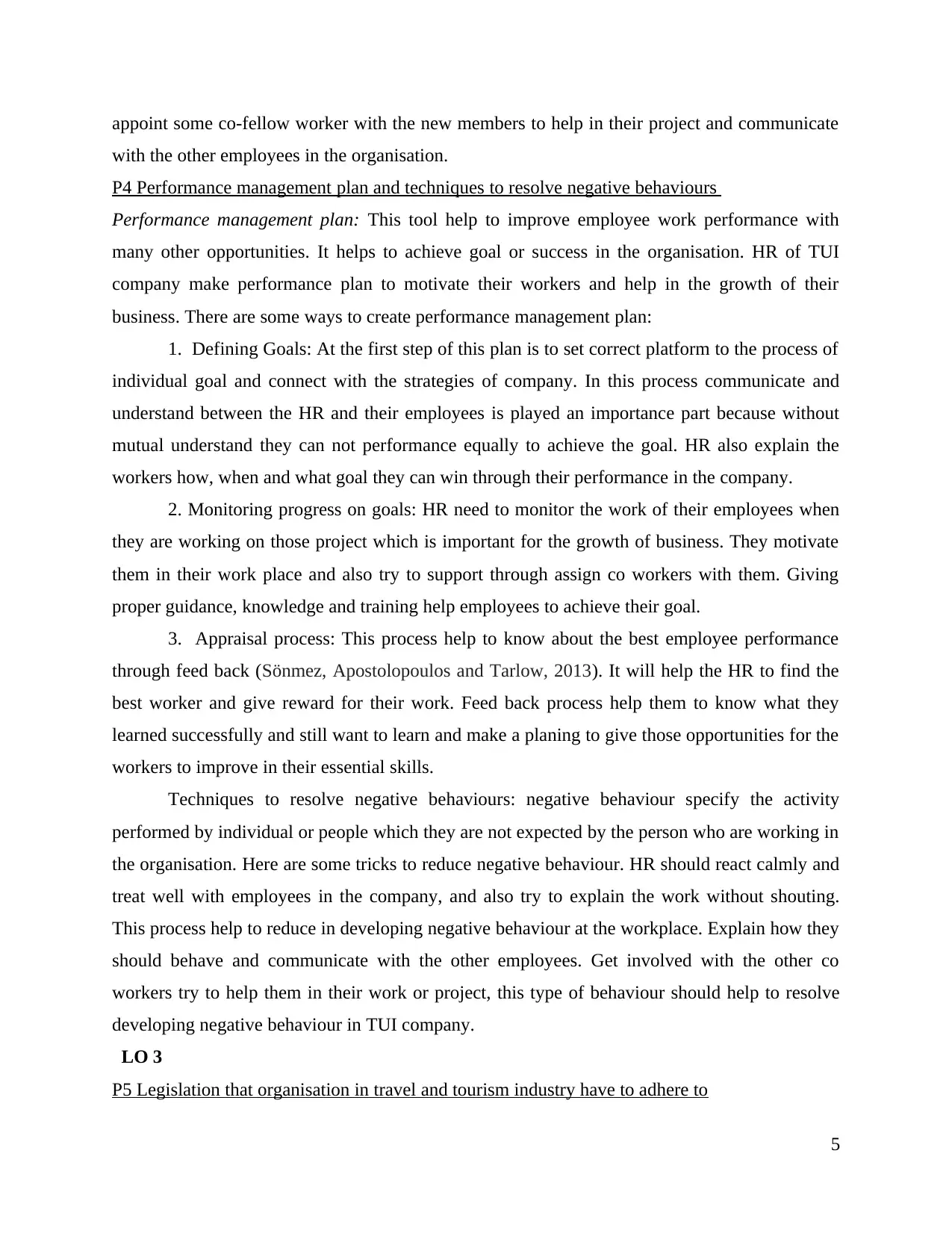
appoint some co-fellow worker with the new members to help in their project and communicate
with the other employees in the organisation.
P4 Performance management plan and techniques to resolve negative behaviours
Performance management plan: This tool help to improve employee work performance with
many other opportunities. It helps to achieve goal or success in the organisation. HR of TUI
company make performance plan to motivate their workers and help in the growth of their
business. There are some ways to create performance management plan:
1. Defining Goals: At the first step of this plan is to set correct platform to the process of
individual goal and connect with the strategies of company. In this process communicate and
understand between the HR and their employees is played an importance part because without
mutual understand they can not performance equally to achieve the goal. HR also explain the
workers how, when and what goal they can win through their performance in the company.
2. Monitoring progress on goals: HR need to monitor the work of their employees when
they are working on those project which is important for the growth of business. They motivate
them in their work place and also try to support through assign co workers with them. Giving
proper guidance, knowledge and training help employees to achieve their goal.
3. Appraisal process: This process help to know about the best employee performance
through feed back (Sönmez, Apostolopoulos and Tarlow, 2013). It will help the HR to find the
best worker and give reward for their work. Feed back process help them to know what they
learned successfully and still want to learn and make a planing to give those opportunities for the
workers to improve in their essential skills.
Techniques to resolve negative behaviours: negative behaviour specify the activity
performed by individual or people which they are not expected by the person who are working in
the organisation. Here are some tricks to reduce negative behaviour. HR should react calmly and
treat well with employees in the company, and also try to explain the work without shouting.
This process help to reduce in developing negative behaviour at the workplace. Explain how they
should behave and communicate with the other employees. Get involved with the other co
workers try to help them in their work or project, this type of behaviour should help to resolve
developing negative behaviour in TUI company.
LO 3
P5 Legislation that organisation in travel and tourism industry have to adhere to
5
with the other employees in the organisation.
P4 Performance management plan and techniques to resolve negative behaviours
Performance management plan: This tool help to improve employee work performance with
many other opportunities. It helps to achieve goal or success in the organisation. HR of TUI
company make performance plan to motivate their workers and help in the growth of their
business. There are some ways to create performance management plan:
1. Defining Goals: At the first step of this plan is to set correct platform to the process of
individual goal and connect with the strategies of company. In this process communicate and
understand between the HR and their employees is played an importance part because without
mutual understand they can not performance equally to achieve the goal. HR also explain the
workers how, when and what goal they can win through their performance in the company.
2. Monitoring progress on goals: HR need to monitor the work of their employees when
they are working on those project which is important for the growth of business. They motivate
them in their work place and also try to support through assign co workers with them. Giving
proper guidance, knowledge and training help employees to achieve their goal.
3. Appraisal process: This process help to know about the best employee performance
through feed back (Sönmez, Apostolopoulos and Tarlow, 2013). It will help the HR to find the
best worker and give reward for their work. Feed back process help them to know what they
learned successfully and still want to learn and make a planing to give those opportunities for the
workers to improve in their essential skills.
Techniques to resolve negative behaviours: negative behaviour specify the activity
performed by individual or people which they are not expected by the person who are working in
the organisation. Here are some tricks to reduce negative behaviour. HR should react calmly and
treat well with employees in the company, and also try to explain the work without shouting.
This process help to reduce in developing negative behaviour at the workplace. Explain how they
should behave and communicate with the other employees. Get involved with the other co
workers try to help them in their work or project, this type of behaviour should help to resolve
developing negative behaviour in TUI company.
LO 3
P5 Legislation that organisation in travel and tourism industry have to adhere to
5
Paraphrase This Document
Need a fresh take? Get an instant paraphrase of this document with our AI Paraphraser
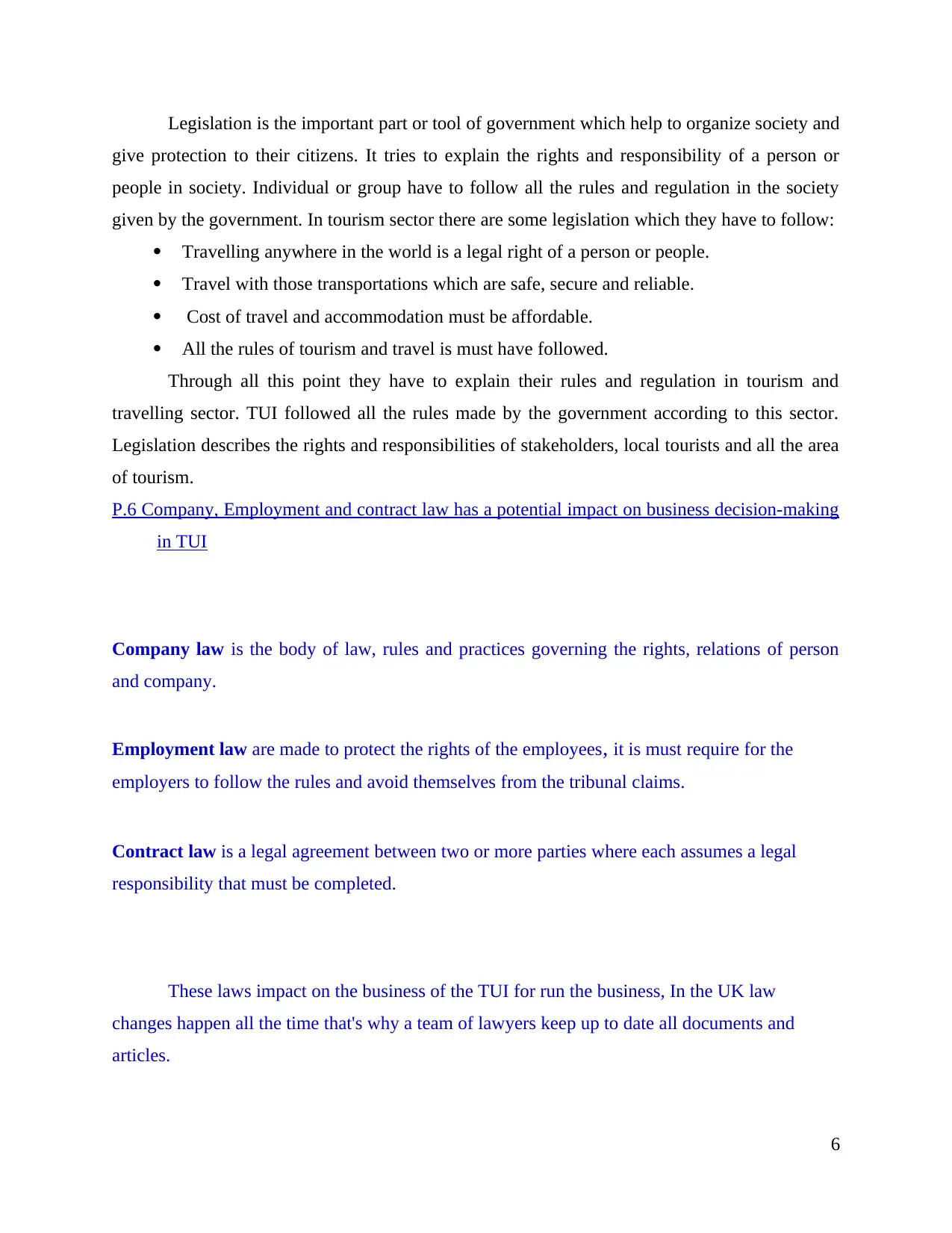
Legislation is the important part or tool of government which help to organize society and
give protection to their citizens. It tries to explain the rights and responsibility of a person or
people in society. Individual or group have to follow all the rules and regulation in the society
given by the government. In tourism sector there are some legislation which they have to follow:
Travelling anywhere in the world is a legal right of a person or people.
Travel with those transportations which are safe, secure and reliable.
Cost of travel and accommodation must be affordable.
All the rules of tourism and travel is must have followed.
Through all this point they have to explain their rules and regulation in tourism and
travelling sector. TUI followed all the rules made by the government according to this sector.
Legislation describes the rights and responsibilities of stakeholders, local tourists and all the area
of tourism.
P.6 Company, Employment and contract law has a potential impact on business decision-making
in TUI
Company law is the body of law, rules and practices governing the rights, relations of person
and company.
Employment law are made to protect the rights of the employees, it is must require for the
employers to follow the rules and avoid themselves from the tribunal claims.
Contract law is a legal agreement between two or more parties where each assumes a legal
responsibility that must be completed.
These laws impact on the business of the TUI for run the business, In the UK law
changes happen all the time that's why a team of lawyers keep up to date all documents and
articles.
6
give protection to their citizens. It tries to explain the rights and responsibility of a person or
people in society. Individual or group have to follow all the rules and regulation in the society
given by the government. In tourism sector there are some legislation which they have to follow:
Travelling anywhere in the world is a legal right of a person or people.
Travel with those transportations which are safe, secure and reliable.
Cost of travel and accommodation must be affordable.
All the rules of tourism and travel is must have followed.
Through all this point they have to explain their rules and regulation in tourism and
travelling sector. TUI followed all the rules made by the government according to this sector.
Legislation describes the rights and responsibilities of stakeholders, local tourists and all the area
of tourism.
P.6 Company, Employment and contract law has a potential impact on business decision-making
in TUI
Company law is the body of law, rules and practices governing the rights, relations of person
and company.
Employment law are made to protect the rights of the employees, it is must require for the
employers to follow the rules and avoid themselves from the tribunal claims.
Contract law is a legal agreement between two or more parties where each assumes a legal
responsibility that must be completed.
These laws impact on the business of the TUI for run the business, In the UK law
changes happen all the time that's why a team of lawyers keep up to date all documents and
articles.
6
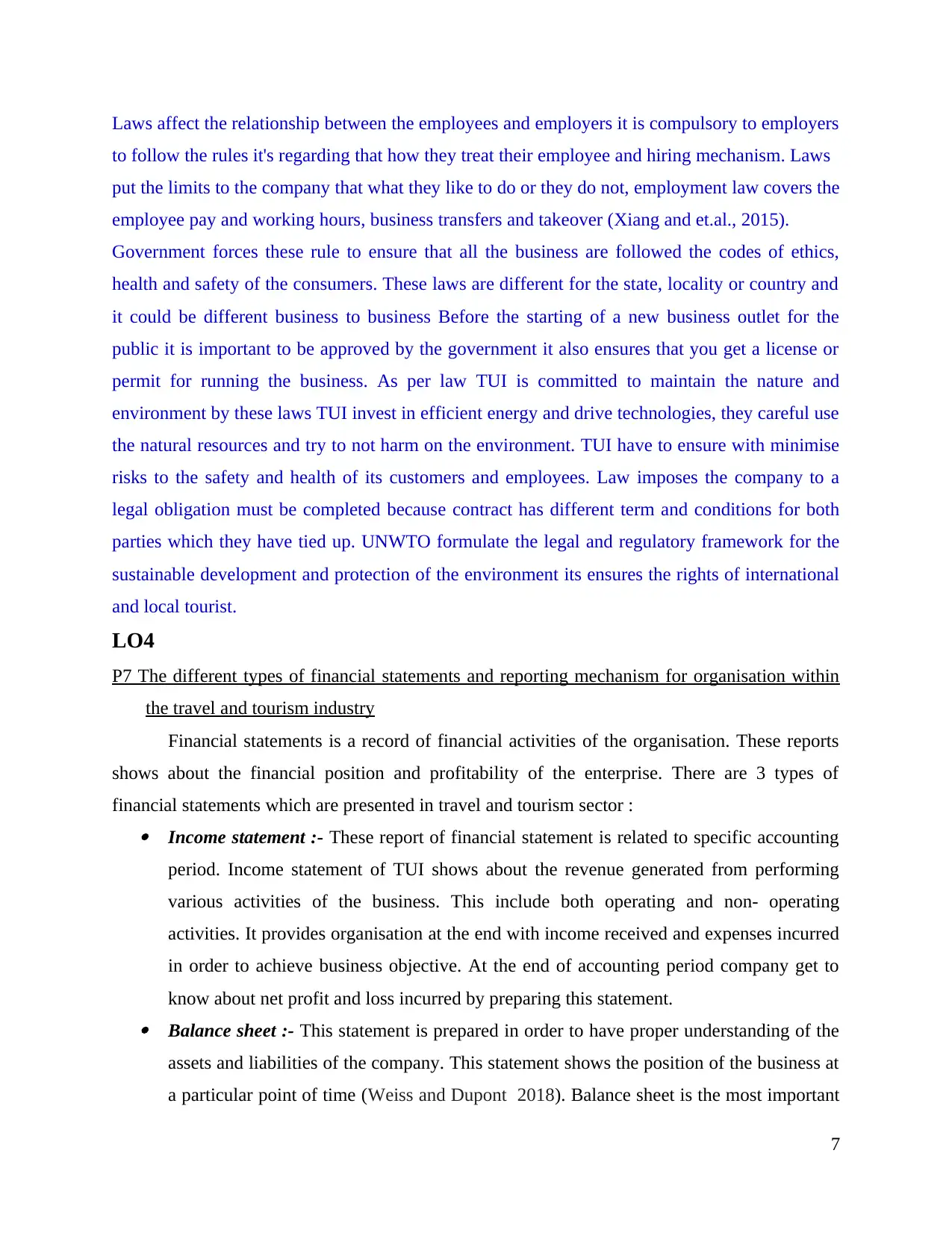
Laws affect the relationship between the employees and employers it is compulsory to employers
to follow the rules it's regarding that how they treat their employee and hiring mechanism. Laws
put the limits to the company that what they like to do or they do not, employment law covers the
employee pay and working hours, business transfers and takeover (Xiang and et.al., 2015).
Government forces these rule to ensure that all the business are followed the codes of ethics,
health and safety of the consumers. These laws are different for the state, locality or country and
it could be different business to business Before the starting of a new business outlet for the
public it is important to be approved by the government it also ensures that you get a license or
permit for running the business. As per law TUI is committed to maintain the nature and
environment by these laws TUI invest in efficient energy and drive technologies, they careful use
the natural resources and try to not harm on the environment. TUI have to ensure with minimise
risks to the safety and health of its customers and employees. Law imposes the company to a
legal obligation must be completed because contract has different term and conditions for both
parties which they have tied up. UNWTO formulate the legal and regulatory framework for the
sustainable development and protection of the environment its ensures the rights of international
and local tourist.
LO4
P7 The different types of financial statements and reporting mechanism for organisation within
the travel and tourism industry
Financial statements is a record of financial activities of the organisation. These reports
shows about the financial position and profitability of the enterprise. There are 3 types of
financial statements which are presented in travel and tourism sector : Income statement :- These report of financial statement is related to specific accounting
period. Income statement of TUI shows about the revenue generated from performing
various activities of the business. This include both operating and non- operating
activities. It provides organisation at the end with income received and expenses incurred
in order to achieve business objective. At the end of accounting period company get to
know about net profit and loss incurred by preparing this statement. Balance sheet :- This statement is prepared in order to have proper understanding of the
assets and liabilities of the company. This statement shows the position of the business at
a particular point of time (Weiss and Dupont 2018). Balance sheet is the most important
7
to follow the rules it's regarding that how they treat their employee and hiring mechanism. Laws
put the limits to the company that what they like to do or they do not, employment law covers the
employee pay and working hours, business transfers and takeover (Xiang and et.al., 2015).
Government forces these rule to ensure that all the business are followed the codes of ethics,
health and safety of the consumers. These laws are different for the state, locality or country and
it could be different business to business Before the starting of a new business outlet for the
public it is important to be approved by the government it also ensures that you get a license or
permit for running the business. As per law TUI is committed to maintain the nature and
environment by these laws TUI invest in efficient energy and drive technologies, they careful use
the natural resources and try to not harm on the environment. TUI have to ensure with minimise
risks to the safety and health of its customers and employees. Law imposes the company to a
legal obligation must be completed because contract has different term and conditions for both
parties which they have tied up. UNWTO formulate the legal and regulatory framework for the
sustainable development and protection of the environment its ensures the rights of international
and local tourist.
LO4
P7 The different types of financial statements and reporting mechanism for organisation within
the travel and tourism industry
Financial statements is a record of financial activities of the organisation. These reports
shows about the financial position and profitability of the enterprise. There are 3 types of
financial statements which are presented in travel and tourism sector : Income statement :- These report of financial statement is related to specific accounting
period. Income statement of TUI shows about the revenue generated from performing
various activities of the business. This include both operating and non- operating
activities. It provides organisation at the end with income received and expenses incurred
in order to achieve business objective. At the end of accounting period company get to
know about net profit and loss incurred by preparing this statement. Balance sheet :- This statement is prepared in order to have proper understanding of the
assets and liabilities of the company. This statement shows the position of the business at
a particular point of time (Weiss and Dupont 2018). Balance sheet is the most important
7
⊘ This is a preview!⊘
Do you want full access?
Subscribe today to unlock all pages.

Trusted by 1+ million students worldwide
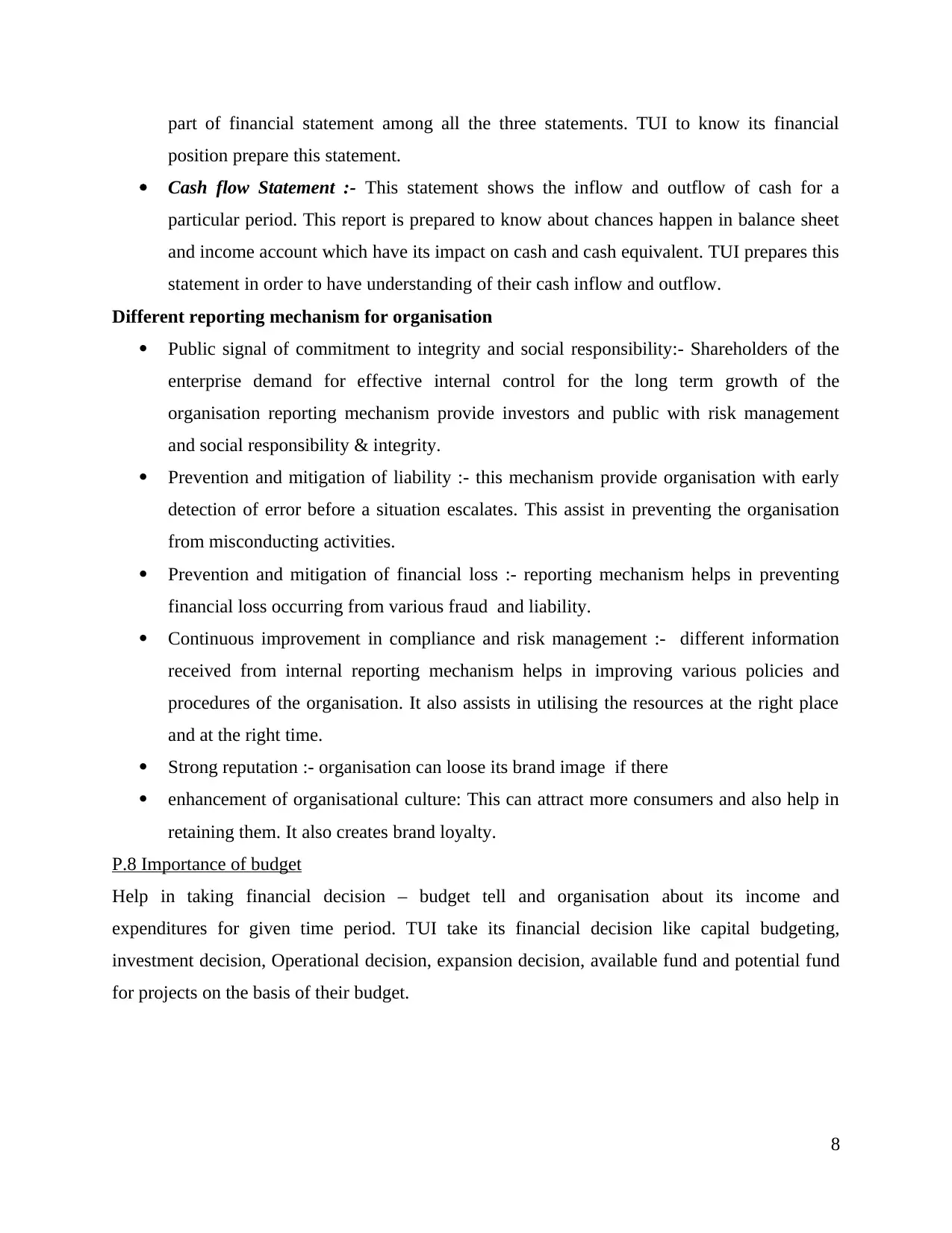
part of financial statement among all the three statements. TUI to know its financial
position prepare this statement.
Cash flow Statement :- This statement shows the inflow and outflow of cash for a
particular period. This report is prepared to know about chances happen in balance sheet
and income account which have its impact on cash and cash equivalent. TUI prepares this
statement in order to have understanding of their cash inflow and outflow.
Different reporting mechanism for organisation
Public signal of commitment to integrity and social responsibility:- Shareholders of the
enterprise demand for effective internal control for the long term growth of the
organisation reporting mechanism provide investors and public with risk management
and social responsibility & integrity.
Prevention and mitigation of liability :- this mechanism provide organisation with early
detection of error before a situation escalates. This assist in preventing the organisation
from misconducting activities.
Prevention and mitigation of financial loss :- reporting mechanism helps in preventing
financial loss occurring from various fraud and liability.
Continuous improvement in compliance and risk management :- different information
received from internal reporting mechanism helps in improving various policies and
procedures of the organisation. It also assists in utilising the resources at the right place
and at the right time.
Strong reputation :- organisation can loose its brand image if there
enhancement of organisational culture: This can attract more consumers and also help in
retaining them. It also creates brand loyalty.
P.8 Importance of budget
Help in taking financial decision – budget tell and organisation about its income and
expenditures for given time period. TUI take its financial decision like capital budgeting,
investment decision, Operational decision, expansion decision, available fund and potential fund
for projects on the basis of their budget.
8
position prepare this statement.
Cash flow Statement :- This statement shows the inflow and outflow of cash for a
particular period. This report is prepared to know about chances happen in balance sheet
and income account which have its impact on cash and cash equivalent. TUI prepares this
statement in order to have understanding of their cash inflow and outflow.
Different reporting mechanism for organisation
Public signal of commitment to integrity and social responsibility:- Shareholders of the
enterprise demand for effective internal control for the long term growth of the
organisation reporting mechanism provide investors and public with risk management
and social responsibility & integrity.
Prevention and mitigation of liability :- this mechanism provide organisation with early
detection of error before a situation escalates. This assist in preventing the organisation
from misconducting activities.
Prevention and mitigation of financial loss :- reporting mechanism helps in preventing
financial loss occurring from various fraud and liability.
Continuous improvement in compliance and risk management :- different information
received from internal reporting mechanism helps in improving various policies and
procedures of the organisation. It also assists in utilising the resources at the right place
and at the right time.
Strong reputation :- organisation can loose its brand image if there
enhancement of organisational culture: This can attract more consumers and also help in
retaining them. It also creates brand loyalty.
P.8 Importance of budget
Help in taking financial decision – budget tell and organisation about its income and
expenditures for given time period. TUI take its financial decision like capital budgeting,
investment decision, Operational decision, expansion decision, available fund and potential fund
for projects on the basis of their budget.
8
Paraphrase This Document
Need a fresh take? Get an instant paraphrase of this document with our AI Paraphraser
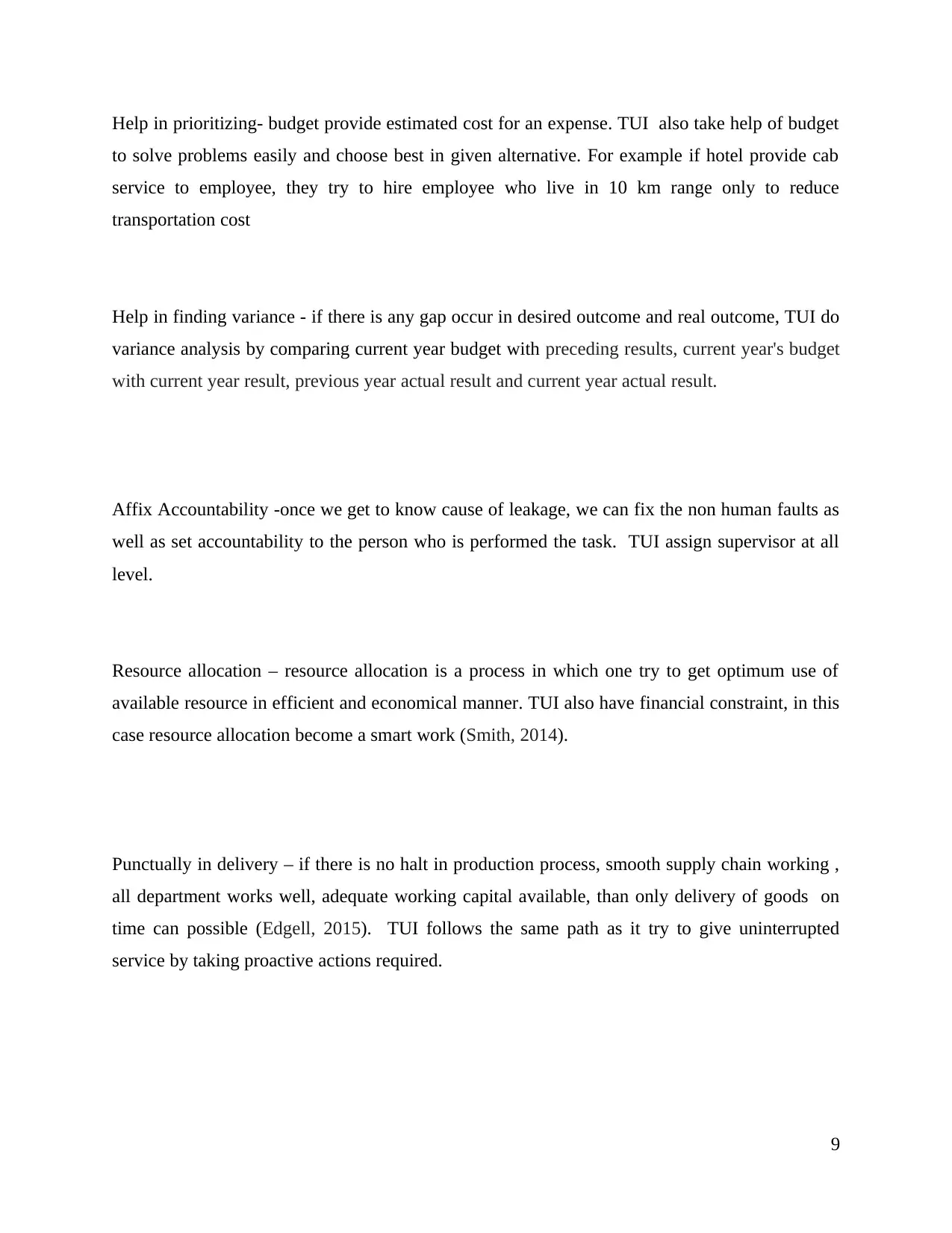
Help in prioritizing- budget provide estimated cost for an expense. TUI also take help of budget
to solve problems easily and choose best in given alternative. For example if hotel provide cab
service to employee, they try to hire employee who live in 10 km range only to reduce
transportation cost
Help in finding variance - if there is any gap occur in desired outcome and real outcome, TUI do
variance analysis by comparing current year budget with preceding results, current year's budget
with current year result, previous year actual result and current year actual result.
Affix Accountability -once we get to know cause of leakage, we can fix the non human faults as
well as set accountability to the person who is performed the task. TUI assign supervisor at all
level.
Resource allocation – resource allocation is a process in which one try to get optimum use of
available resource in efficient and economical manner. TUI also have financial constraint, in this
case resource allocation become a smart work (Smith, 2014).
Punctually in delivery – if there is no halt in production process, smooth supply chain working ,
all department works well, adequate working capital available, than only delivery of goods on
time can possible (Edgell, 2015). TUI follows the same path as it try to give uninterrupted
service by taking proactive actions required.
9
to solve problems easily and choose best in given alternative. For example if hotel provide cab
service to employee, they try to hire employee who live in 10 km range only to reduce
transportation cost
Help in finding variance - if there is any gap occur in desired outcome and real outcome, TUI do
variance analysis by comparing current year budget with preceding results, current year's budget
with current year result, previous year actual result and current year actual result.
Affix Accountability -once we get to know cause of leakage, we can fix the non human faults as
well as set accountability to the person who is performed the task. TUI assign supervisor at all
level.
Resource allocation – resource allocation is a process in which one try to get optimum use of
available resource in efficient and economical manner. TUI also have financial constraint, in this
case resource allocation become a smart work (Smith, 2014).
Punctually in delivery – if there is no halt in production process, smooth supply chain working ,
all department works well, adequate working capital available, than only delivery of goods on
time can possible (Edgell, 2015). TUI follows the same path as it try to give uninterrupted
service by taking proactive actions required.
9
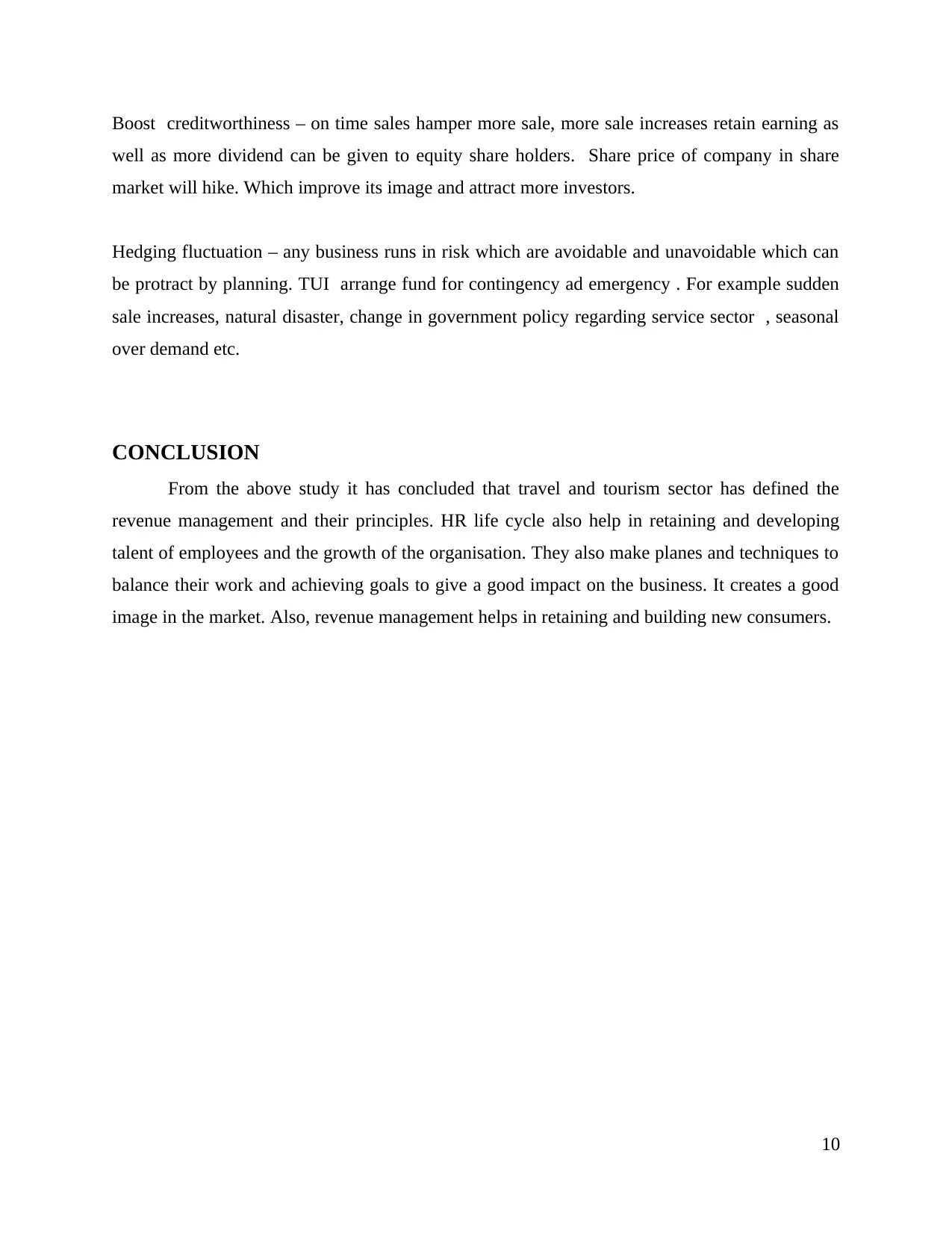
Boost creditworthiness – on time sales hamper more sale, more sale increases retain earning as
well as more dividend can be given to equity share holders. Share price of company in share
market will hike. Which improve its image and attract more investors.
Hedging fluctuation – any business runs in risk which are avoidable and unavoidable which can
be protract by planning. TUI arrange fund for contingency ad emergency . For example sudden
sale increases, natural disaster, change in government policy regarding service sector , seasonal
over demand etc.
CONCLUSION
From the above study it has concluded that travel and tourism sector has defined the
revenue management and their principles. HR life cycle also help in retaining and developing
talent of employees and the growth of the organisation. They also make planes and techniques to
balance their work and achieving goals to give a good impact on the business. It creates a good
image in the market. Also, revenue management helps in retaining and building new consumers.
10
well as more dividend can be given to equity share holders. Share price of company in share
market will hike. Which improve its image and attract more investors.
Hedging fluctuation – any business runs in risk which are avoidable and unavoidable which can
be protract by planning. TUI arrange fund for contingency ad emergency . For example sudden
sale increases, natural disaster, change in government policy regarding service sector , seasonal
over demand etc.
CONCLUSION
From the above study it has concluded that travel and tourism sector has defined the
revenue management and their principles. HR life cycle also help in retaining and developing
talent of employees and the growth of the organisation. They also make planes and techniques to
balance their work and achieving goals to give a good impact on the business. It creates a good
image in the market. Also, revenue management helps in retaining and building new consumers.
10
⊘ This is a preview!⊘
Do you want full access?
Subscribe today to unlock all pages.

Trusted by 1+ million students worldwide
1 out of 13
Related Documents
Your All-in-One AI-Powered Toolkit for Academic Success.
+13062052269
info@desklib.com
Available 24*7 on WhatsApp / Email
![[object Object]](/_next/static/media/star-bottom.7253800d.svg)
Unlock your academic potential
Copyright © 2020–2026 A2Z Services. All Rights Reserved. Developed and managed by ZUCOL.





